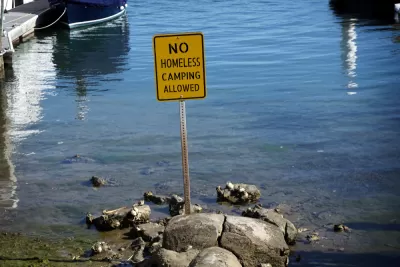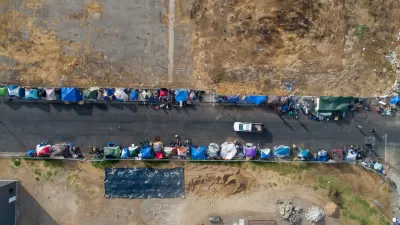Days before facing reelection, Governor Newsom rejected every California locality’s plan for addressing homelessness, calling the proposals inadequate in fighting the massive crisis in a state where over 100,000 people are unhoused.

The battle over housing in California continues, with Governor Gavin Newsom—up for reelection today—rejecting every city’s proposed plan to help the growing number of residents experiencing homelessness, reports Anita Chabria in the Los Angeles Times.
Around the state, local opposition has stymied efforts to build affordable housing. “Time and again, people agree that the current situation is untenable and something’s got to give — as long as they’re not the ones who have to give it,” Chabria explains.
Chabria points out that while the move is “largely symbolic,” it could motivate cities to draft more aggressive plans and imperil hundreds of millions of dollars in state funding that could be withheld until cities and counties put forward more aggressive plans. “Newsom is sending an unexpected but clear message that the relationship between the state and local entities is about to change when it comes to homelessness. He seems genuinely willing to jump onto that third rail of politics, local control — similar to what the administration has done in cracking down on places that refuse to build their fair share of affordable housing.”
In a separate article on CalMatters, Manuela Tobias criticizes Newsom’s own record on housing. Tobias points out that, after campaigning with big promises on housing, “Just 13% of the 3.5 million homes he campaigned on building have been permitted, let alone built.” And while California cracked down on cities over their Regional Housing Needs Assessment plans, some local leaders say the state doesn’t offer enough subsidies and other support to build the needed housing units.
FULL STORY: Column: Newsom rejects every local homeless plan in state, demanding more ambition

Planetizen Federal Action Tracker
A weekly monitor of how Trump’s orders and actions are impacting planners and planning in America.

Maui's Vacation Rental Debate Turns Ugly
Verbal attacks, misinformation campaigns and fistfights plague a high-stakes debate to convert thousands of vacation rentals into long-term housing.

Restaurant Patios Were a Pandemic Win — Why Were They so Hard to Keep?
Social distancing requirements and changes in travel patterns prompted cities to pilot new uses for street and sidewalk space. Then it got complicated.

In California Battle of Housing vs. Environment, Housing Just Won
A new state law significantly limits the power of CEQA, an environmental review law that served as a powerful tool for blocking new development.

Boulder Eliminates Parking Minimums Citywide
Officials estimate the cost of building a single underground parking space at up to $100,000.

Orange County, Florida Adopts Largest US “Sprawl Repair” Code
The ‘Orange Code’ seeks to rectify decades of sprawl-inducing, car-oriented development.
Urban Design for Planners 1: Software Tools
This six-course series explores essential urban design concepts using open source software and equips planners with the tools they need to participate fully in the urban design process.
Planning for Universal Design
Learn the tools for implementing Universal Design in planning regulations.
Heyer Gruel & Associates PA
JM Goldson LLC
Custer County Colorado
City of Camden Redevelopment Agency
City of Astoria
Transportation Research & Education Center (TREC) at Portland State University
Jefferson Parish Government
Camden Redevelopment Agency
City of Claremont





























